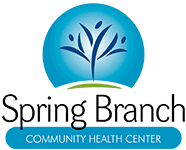April Is STI Awareness Month

An STI is an infection passed from one person to another person through sexual contact. STIs are usually spread by vaginal, oral, or anal sex. Some STIs don’t show symptoms, which is why it is always important to wear condoms every time to reduce your risk and get regular testing!
Types of STIs
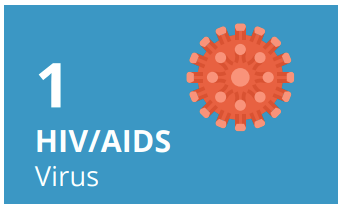 HIV stands for human immunodeficiency virus. It weakens a person’s immune system by destroying important cells that fight disease and infection. There is currently no effective cure for HIV or AIDS but with proper medical care, it can be controlled.
HIV stands for human immunodeficiency virus. It weakens a person’s immune system by destroying important cells that fight disease and infection. There is currently no effective cure for HIV or AIDS but with proper medical care, it can be controlled.
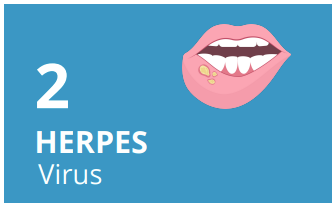 Genital herpes is a very common STI, but most people with the infection do not know they have it. While there is no cure, there are medicines available that can prevent or shorten the outbreaks.
Genital herpes is a very common STI, but most people with the infection do not know they have it. While there is no cure, there are medicines available that can prevent or shorten the outbreaks.
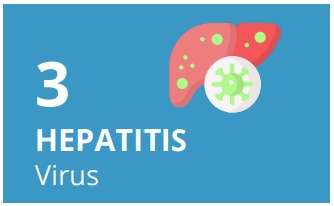 Viral hepatitis is the leading cause of liver cancer and the most common reason for liver transplants. Sexual contact with an infected person can pass the virus.
Viral hepatitis is the leading cause of liver cancer and the most common reason for liver transplants. Sexual contact with an infected person can pass the virus.
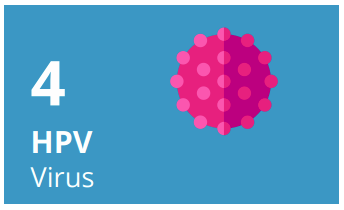 Human Papillomavirus (HPV) is the most common STI in the U.S., but most people with the infection have no symptoms. The HPV vaccine can prevent the cancers and genital warts that certain infections may cause.
Human Papillomavirus (HPV) is the most common STI in the U.S., but most people with the infection have no symptoms. The HPV vaccine can prevent the cancers and genital warts that certain infections may cause.
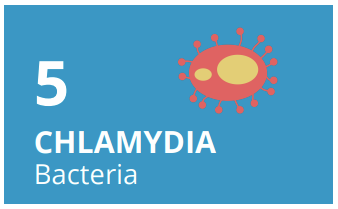
Chlamydia is a common STI that can cause infection among both men and women. It can cause permanent damage to a woman’s reproductive system.
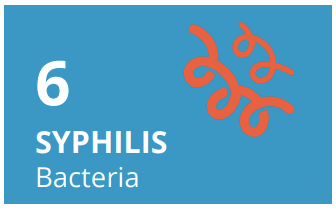 Syphilis is an STI that can cause serious health problems without treatment. Infection develops in several stages, but usually starts as a painless sore.
Syphilis is an STI that can cause serious health problems without treatment. Infection develops in several stages, but usually starts as a painless sore.
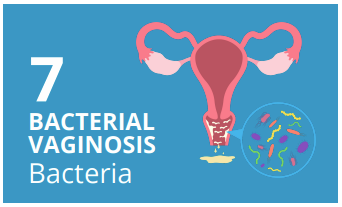 Bacterial vaginosis (BV) is a condition that happens when there is too much of certain bacteria in the vagina. This changes the normal balance of bacteria in the vagina and causes discharge.
Bacterial vaginosis (BV) is a condition that happens when there is too much of certain bacteria in the vagina. This changes the normal balance of bacteria in the vagina and causes discharge.
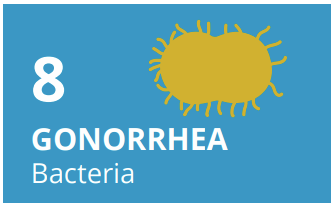 Gonorrhea is a common STI that can be treated with the right medication. If left untreated, gonorrhea can cause very serious health problems.
Gonorrhea is a common STI that can be treated with the right medication. If left untreated, gonorrhea can cause very serious health problems.
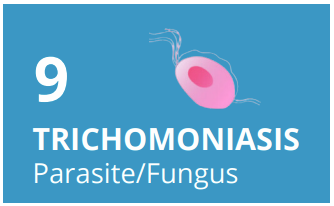 Trichomoniasis is a very common STI caused by infection with Trichomonas vaginalis (a protozoan parasite). Symptoms vary, most people who have trich cannot tell they have it.
Trichomoniasis is a very common STI caused by infection with Trichomonas vaginalis (a protozoan parasite). Symptoms vary, most people who have trich cannot tell they have it.
Testing and Protection
Since you cannot always tell whether you or your partner has an infection, if you are going to be sexually active, it is important to be tested often and to always use protection.
To access free condoms, rapid HIV testing, and referrals, call 832-982-8353.
